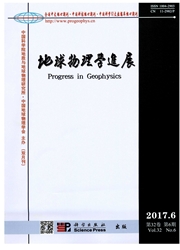

 中文摘要:
中文摘要:
本文利用卫星重力数据对2001-2007年由卫星测高数据计算的热比容海平面变化进行了改正,通过结合Argo数据计算了各层平均热膨胀系数,继而获取了全球、大西洋和印度洋的海水热含量变化.结果显示,黑潮和墨西哥湾流分别使西太平洋和大西洋海域水温增加,从而导致该海域海水热含量变化较大.利用傅里叶变换和小波分析分别对全球海域、大西洋海域和印度洋海域的海水热含量变化周期进行了分析,结果表明,三个海域都存在长周期和1年的变化周期,与其他学者得到结论一致.利用相关性分析了海水热含量变化与NINO3.4海域的海温变化之间的关联,结果显示,全球海域、大西洋海域和印度洋海域的海水热含量变化在滞后5个月后,与NINO3.4海面温度相关性最大.相比全球和印度洋海域,在大西洋海域的海水热含量变化与NINO3.4海面温度存在的相关性较小,而全球海域的海水热含量变化与NINO3.4海面温度的相关性最大,说明NINO3.4海面温度变化后将引起全球海洋中热量的重新分配,对全球海洋热含量变化有较大影响.
 英文摘要:
英文摘要:
The correction method is advanced by using satellite gravity data to correct the specific volume of sea level change from 2001 to 2007in the paper.After the thermal expansion coefficient being computed according to Argo data,the ocean heat content in global ocean.The results show that the temperatures of the Western Pacific and the Atlantic are increased by Kuroshio Current and Warm Current of Mexico Gulf which lead to bigger change of ocean heat content.The change period of ocean heat content is analyzed with Fourier transform and wavelet transformation respectively in above three oceans.The main periods are long period variation and annual variation in the above three oceans which is of the same view of other scholars.The correlation coefficient between heat content change in global ocean,the Atlantic ocean and the Indian ocean and NINO3.4SST are analyzed and the results show that the correlation is biggest when the heat content change is lagged 5months,and its coefficient are respectively+0.2789、+0.2078 and +0.2494,confidence level are respectively 98.7%、93.4%and 97.4%.the conclusion can be made from the coefficients and confidence levels that the ocean heat content and NINO3.4SST have a weaker correlation in the Atlantic ocean meanwhile a stronger correlation in global ocean.In a conclusion,NINO3.4SST variation may lead to the redistribution of global ocean heat and influence global ocean heat content change.
 同期刊论文项目
同期刊论文项目
 同项目期刊论文
同项目期刊论文
 期刊信息
期刊信息
